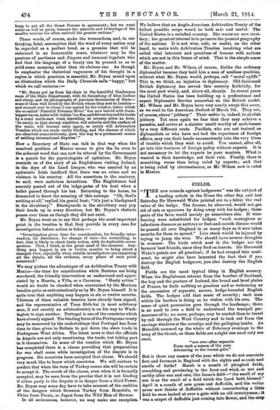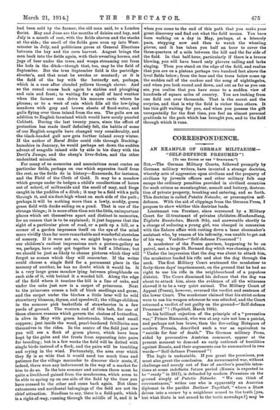FIELDS.
..TriE new crusade against hedgerows" was the subject of a new article in the Times the other day, and last Saturday Sir Herewald Wake pointed out in a letter the real value of the hedge. The farmer, he observed, would not get. rid of rats or sparrows by doing away with his hedges; those pests of the farm would merely go somewhere else. If wire.. fencing were substituted for hedges, such contagious or infections diseases as anthrax or foot-and-mouth disease would be passed all over England in as many days as it now takes months for them to spread." Live stock would be injured by trying to jump the wire. We should have severer droughts in summer. The birds which nest in the hedges are the farmers' best friends, since they feed on insects. Sir Herewald Wake's points are all practical ; if he had strayed into senti- ment, he might also have lamented the fact that if you destroy the English hedgerow, you also destroy the English field.
Fields are the most typical thing in English scenery. When the Englishman returns from the heather of Scotland, the bog and the pasture of Ireland, the broad and level plains of France, he finds nothing so gracious and so welcoming as the succession of separate, secure, hedge-bounded English fields. The hedges add that sense of security; each man within his borders is doing as he wishes with his own. The sense of quiet possession goes through the landscape; there is no need to own a field to understand the tranquil per- manence of it; no more, perhaps, may be needed than to travel by rail through the West Country and to look out from the carriage windows at the cowslips and the galloping lambs. As Meredith summed up the whole of February evenings in the song of the thrush, so those fields are a sight one need only see
One"
"nor ever after separate From such a season of the year Advancing to the vernal gate."
But is there any season of the year which we do not associate first and foremost in England with the sights and sounds and smells of fields? March is a month of ploughed fields, crumbling and powdering in the frost and wind, or wet and earthy after sun and rain, like Isaac's field—" the smell of my son is as the smell of a field which the Lord bath blessed." April is a month of new grass and daffodils, and the writer never now thinks of daffodils without remembering a little field he once looked at over a gate with an old countryman ; lb was a carpet of daffodils just come' g into flower, and the crop
had been sold by the farmer, the old man said, to a London florist. May and June are the months of daisies and hay, and July is a month of rest, with the fields shaven and the stacks at the side ; the smell of the fields goes even up into West- minster in. July, and politicians guess at General Elections between the hay and the corn harvest. August brings the men back into the fields again, with their sweating horses, and jugs of beer under the trees, and wasps streaming out from the hole in the ditch—though that, too, may be the field of September. But the true September field is the partridge- shooter's, and that must be swedes or mustard; or it is the field of the boy with the butterfly net, perhaps, which is a race after clouded yellows through clover. And so the round comes back again to stables and ploughing and rain and frost; to waiting for a spell of hard weather when the farmer can drive his manure carts where he pleases; or to a week of rain which fills all the low-lying meadows with grey and brown sheets of flood-water, and gulls flying over them inland from the sea. The gulls are an addition to English farmland which would have sorely puzzled Cobbett. During the last twenty years, since the effect of protection has made itself definitely felt, the habits of some of our English seagulls have changed very considerably, and the black-headed gull now gets further inland every winter. If the author of .Rwral Bides could ride through Bucking- hamshire in January, he would perhaps set down the sudden advent of seagulls inland side by side in his diary with the Devil's Jumps, and the sheep's liver-flukes, and the other undoubted miracles.
For many of us memories and associations must centre on particular fields, perhaps on one which separates itself from the rest, as the fields do in history—Runemede, for instance, and the Field of the Cloth of Gold. It may be a meadow which groups under its hedges a child's recollections of hours out of school, of milkmaids and the smell of may, and frogs caught in the puddles of a ditch; it may be a field with a path through it, and six-foot-high wheat on each side of the path ; perhaps it will be nothing more than a lowly, muddy, green grass field with ducks sailing on a pond. That is one of the strange things; it is more often than not the little, unimportant places which set themselves apart and distinct in memories, for no reason that is to be explained; it just happens that the sight of a particular piece of road, or a path up a hill, or a corner of a garden impresses itself on the eye of the mind more vividly than far more remarkable and wonderful stretches of scenery. If it were not so, we might hope to choose for our children's earliest impressions such a picture-gallery as we, perhaps, have only got together in half a lifetime; but we should be just as likely to choose pictures which they will forget as scenes which they will remember. If the writer could choose a single field for a permanent place in the memory of another, he has no doubt which it would be. It is a very large grass meadow lying between ploughlands on each side of it, with behind it a wooded hill. Along the edge of the field where it touches the bill is a line of oaks, and under the oaks just now is a carpet of primroses. Next to the primroses comes a belt of birch seedlings and gorse, and the carpet under the birches a little later will be wild strawberry blossom, thyme, and speedwell; the village children in the summer pick basketfuls of strawberries in a few yards of ground. The western end of this belt, for one of those obscure reasons which govern the choices of butterflies, is alive in May with green hairstreaks, blues, and small coppers; just inside the wood, pearl-bordered fritillaries sun themselves in the rides. In the centre of the field just now you will see a flock of green plover, which have been kept by the gales and the frosts from separating into pairs for breeding ; but in a few weeks the field will be dotted with single birds instead of a flock, and the pairs will be tumbling and crying in the wind. Fortunately, the area over which they fly is so wide that it would need too much time and patience for the village marauder to discover their nests, if, indeed, there were any inducement in the way of a market for him to do so. In the late summer and autumn there must be quite a livelihood gained from the mushrooms, which seem to be able to spring up on one side of the field by the time you have crossed to the other and come back again. But these extraneous and accidental belongings of the field are not its chief attraction. Needless to say, there is a field-path, which is a right-of-way, running through the middle of it, and it is
when you come to the end of this path that you make your great discovery and find out what the field means. You have been walking on a day in May, perhaps, at a leisurely pace, stopping now and then to watch the wheeling plover, and it has taken you half an hour to cover the three-quarters of a mile between the hill and the far side of the field. In that half-hour, particularly if there is a breeze blowing, you will have heard only plovers calling and larks singing. Then you stand on the edge of the field, and realise that you are on a plateau perhaps two hundred feet above the level fields below; from the lane and the trees below come up the sudden call of the cuckoo and the song of nightingalea, and when you look round and down, and out as far as you can see, you realize that you have come to a sudden view of hundreds of square miles of country. You are looking front one field out over thousands. That is the secret and the surprise, and that is why the field is richer than others. It has this gift waiting for you, and when you possess the gift unexpectedly for the first time, you feel an almost personal gratitude to the path which has brought you, and to the field through which it runs.











































 Previous page
Previous page